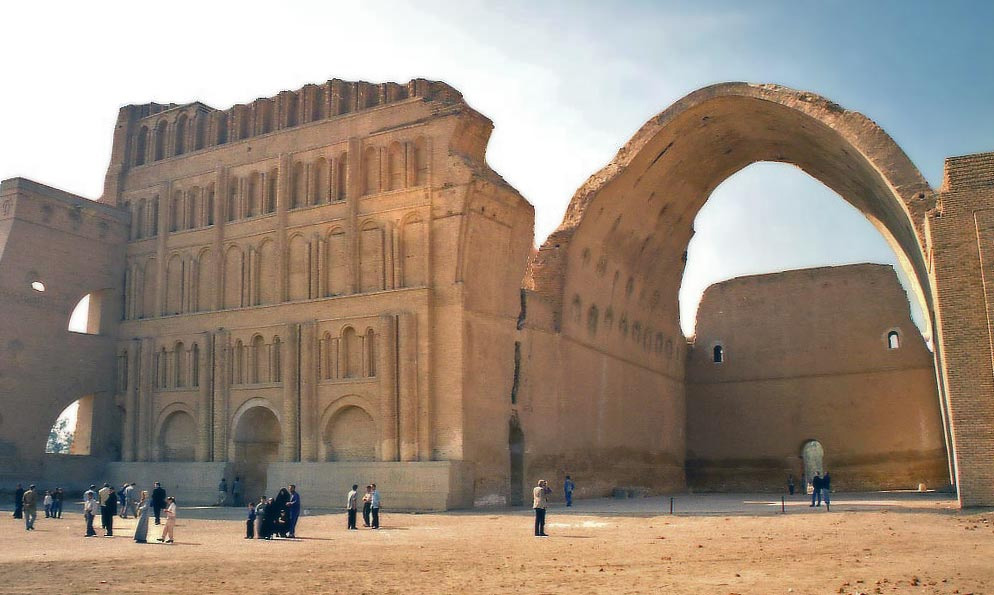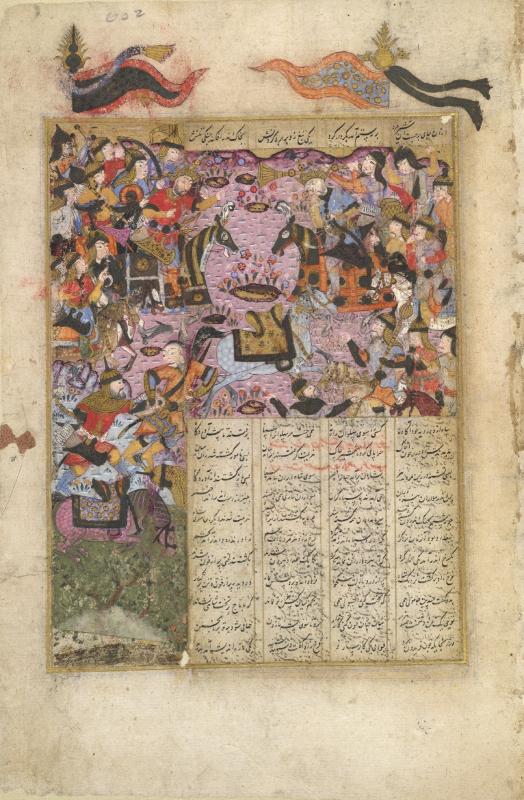Primary sources on the Bajīlah’s ‘fourth’

Table of contents
1. Abū Yūsuf (c. 731/732–798)

1.1 Ismāʿīl b. Abī Khālid←Qays b. Abī Ḥāzim
The tribe of Bajīla formed one-fourth of the army which fought the Battle of al-Qādisīya. When a man of the Thaqīf, who deserted to the Persians, informed them that the Bajīla tribe are the most dangerous, the Persians confronted the Bajīla fighters with 16 elephants, while against all the rest only two were deployed. Abū Thawr, ʿAmr b. Maʿdīkārib [sic], however, encouraged his men saying: O you associates of the Emigrants! Be like lions! The Persians are like a roe-buck against a spear and their cavalry cannot attack. I called out: Rely on God O Abū Thawr! And then I saw how a Persian threw his spear at him but hit his horse, and how ʿAmr attacked and slaughtered the Persian like a lamb, taking away from him two golden bracelets, one embroidered coat and a golden belt. After the enemy was vanquished a quarter of al-Sawād was given to the Bajīla tribe and they possessed it for three years. When Jarīr visited ʿUmar b. al-Khaṭṭāb he said to him: O Jarīr, I am responsible for the distribution of the lands, and I think that your land should go back to the Muslims as a whole. Thereupon Jarīr caused the lands to be vacated and ʿUmar granted him a stipend of 80 dinars.
Source: Abū Yūsuf, Kharāj, 31-32 (Arabic); English translation from idem, Taxation, 95-96. (Cf. Yaḥyā b. Ādam, 2.2–2.4.)
2. Yaḥyā b. Ādam (c. 757/758–818)

2.1 Abū ʿAlī Ismāʿīl b. Muḥammad b. Ismāʿīl aṣ-Ṣaffār←Abū Muḥammad al-Ḥasan b. ʿAlī b. ʿAffān al-Kūfī←Yaḥyā b. Ādam←ʿAbd as-Salām b. Ḥarb←Ismāʿīl b. Abī Khālid←Qays b. Abī Ḥāzim
ʿUmar gave to Jarīr and his tribe [of Bajīlah] the fourth part of the Sawād and they held it two or three years. Then Jarīr went visiting ʿUmar together with ʿAmmār [b. Yāsir]. ʿUmar said to him: Oh Jarīr! Were I not responsible for the division (lawlā innī qāsim al-masʾul), you would be left as you are, but I think you should give it back to the Muslims
. So they returned it, and ʿUmar gave them 80 dinars.
Source: Yaḥyā b. Ādam, Livre, 29 (Arabic); English translation from idem, Taxation, 42§109.

2.2 Abū ʿAlī Ismāʿīl b. Muḥammad b. Ismāʿīl aṣ-Ṣaffār←Abū Muḥammad al-Ḥasan b. ʿAlī b. ʿAffān al-Kūfī←Yaḥyā b. Ādam←Ibn Abī Zāʾidah←Ismāʿīl b. Abī Khālid←Qays b. Abī Ḥāzim
On the battlefield of al-Qādisīya, we were one-fourth of the people, so ʿUmar gave us the fourth part of the Sawād and we held it for three years. Then Jarīr went to visit ʿUmar who told him: By God! If I were not the one responsible for the division, you would be left on what was allotted to you, but I think you should return it to the Muslims. This (Jarīr) did. ʿUmar allowed him 80 dinars.
Source: Yaḥyā b. Ādam, Livre, 29 (Arabic); English translation from idem, Taxation, 42§110.
2.3 Abū ʿAlī Ismāʿīl b. Muḥammad b. Ismāʿīl aṣ-Ṣaffār←Abū Muḥammad al-Ḥasan b. ʿAlī b. ʿAffān al-Kūfī←Yaḥyā b. Ādam←Ibn Mubārak←Ḥammād b. Salamah←Dāwūd b. Abī Hind←ash-Shaʿbī
ʿUmar said to Jarīr: Would you like to go to al-ʿIrāq if I allow you a fourth or a third of the land and everything, after the ‘fifth’ (has been deducted)?
Source: Yaḥyā b. Ādam, Livre, 29 (Arabic); English translation from idem, Taxation, 42§111.
2.4 Abū ʿAlī Ismāʿīl b. Muḥammad b. Ismāʿīl aṣ-Ṣaffār←Abū Muḥammad al-Ḥasan b. ʿAlī b. ʿAffān al-Kūfī←Yaḥyā b. Ādam←Ibn Mubārak←Ismāʿīl b. Abī Khālid←Qays b. Abī Ḥāzim
ʿUmar gave (the tribe of) Bajīla the fourth of the Sawād. They held it for two years. Then Jarīr visted ʿUmar. The latter told him: If I were not the one responsible for the division, you could stay on what was allotted to you, but I think you should return it
. And Jarīr returned it, and was allowed 80 dinars.
Source: Yaḥyā b. Ādam, Livre, 29 (Arabic); English translation from idem, Taxation, 42§112.
Bibliography and further reading
Abū Yūsuf Yaʿqūb b. Ibrāhīm al-Kūfī. Kitāb al-kharāj. 1st edition. Cairo: al-Maṭbaʿah as-Salafiyyah wa-maktabatuhā, 1934.
Abū Yūsuf Yaʿqūb b. Ibrāhīm al-Kūfī. Taxation in Islām. Ed. and transl. from Arabic by Aharon Ben Shemesh. Vol. 3, Abū Yūsuf’s Kitāb al-kharāj. Leiden & London: E J Brill; Luzac, 1969.
al-Balādhurī, Aḥmad b. Yaḥyā. Liber expugnationis regionum. 2nd ed. Ed. Michael Jan de Goeje. 1866. Reprint, Leiden: E J Brill, 1968. [online]
al-Balādhurī, Aḥmad b. Yaḥyā. The Origins of the Islamic state, being a translation from the Arabic accompanied with annotations, geographic and historic notes of the Kitâb futûḥ al-buldân of al-Imâm abu-l ʿAbbâs Aḥmad ibn-Jâbir al-Balâdhuri. Khayats Oriental reprint, 11. Ed. and transl. from Arabic by Philip Khuri Hitti. Vol. 1. 1916. Reprint, Beirut: Khayats, 1966. [online]
Becker, Carl Heinrich. ‘al-Balād̲h̲urī, Aḥmad b. Yaḥyā b. Ḏj̲ābir b. Dāwūd’. In Encyclopædia of Islam. 2nd ed. Leiden: E J Brill, 1960–2005. Vol. 1, 971 (DOI 10.1163/1573-3912_islam_COM_0094).
Bosworth, Clifford Edmund. ‘al-Ṭabarī, Abū Ḏj̲afar Muḥammad b. Ḏj̲arīr b. Yazīd’. In Encyclopædia of Islam. 2nd ed. Leiden: E J Brill, 1960–2005. Vol. 10, 11–15 (DOI 10.1163/1573-3912_islam_COM_1133).
Donner, Fred McGraw. The Early Islamic conquests. Princeton: Princeton University Press, 1981. [online (excerpt)]
Görke, Andreas. ‘Eschatology, history and the common link: A Study in methodology’. In Method and theory in the study of Islamic origins, ed. Herbert Berg, 179–208. Islamic history and civilization: Studies and texts, 49. Leiden/Boston: E J Brill, 2003 (DOI 10.1163/9789047401575_012).
Ibn Abī Shaybah, Abū Bakr ʿAbd-Allāh b. Muḥammad al-Kūfī. Kitāb al-Muṣannaf fī al-aḥādīth wa-ʾl-athār. 15 vols. 1st ed. Riyāḍ: Maktabat ar-Rushd Nāshirūn, 2004/1425.
al-Jaṣṣāṣ, Aḥmad b. ʿAlī Abū Bakr al-Rāzī. Aḥkām al-Qurʾān. 5 vols. Ed. Muḥammad al-Ṣādiq Qamḥawī. Beirut: Dār Iḥyāʾ al-Turāth al-ʿArabiyyah, 1992/1312. [online]
Juynboll, Gautier H A. ‘(Re)appraisal of some technical terms in ḥadīth science’. Islamic Law & Society 8.3 (2001): 303–349 (DOI 10.1163/156851901317230611). [JStor]
Juynboll, Gautier H A. ‘Some isnād-analytical methods illustrated on the basis of several woman-demeaning sayings from ḥadīth literature’. In Ḥadīth: Origins and developments, ed. Harald Motzki, 175–216. The Formation of the classical Islamic world, 28. Aldershot, UK/Burlington: Ashgate/Variorum, 2004.
al-Khaṭīb al-Baghdādī, Abū Bakr Aḥmad b. ʿAlī ash-Shāfiʿī. Taʾrīkh Baghdād. 17 vols. 1st ed. Beirut: Dār al-Gharb al-Islāmī, 2001/1422.
Landau-Tasseron, Ella. ‘Sayf ibn ʿUmar in medieval and modern scholarship’. Der Islam 67.1 (1990): 1–26 (DOI 10.1515/islm.1990.67.1.1).
Lewental, D Gershon. ‘Qādisiyyah, then and now: A Case study of history and memory, religion, and nationalism in Middle Eastern discourse’. PhD dissertation, Department of Near Eastern & Judaic Studies, Brandeis University, 2011. [abstract]
Morony, Michael G. Iraq after the Muslim conquest. 1st ed. 1984. Reprint, Piscataway, New Jersey: Gorgias Press, 2005.
Motzki, Harald. ‘Dating Muslim traditions: A Survey’. Arabica 52.2 (April 2005): 204–253 (10.1163/1570058053640349). [JStor]
Noth, Albrecht, in collaboration with Lawrence Irving Conrad. The Early Arabic historical tradition: A Source-critical study. Studies in late antiquity and early Islam, 3. Translated from German by Michael Bonner. 2nd edition. Princeton: Darwin Press, 1994.
Pellat, Charles. ‘Ibn Abī S̲h̲ayba, Abū Bakr ʿAbd Allāh b. Muḥammad b. Ibrāhīm (= Abū S̲h̲ayba) b. ʿUt̲h̲mān al-ʿAbsī al-Kūfī’. In Encyclopædia of Islam. 2nd ed. Leiden: E J Brill, 1960–2005. Vol. 3, 692 (DOI 10.1163/1573-3912_islam_SIM_3055).
Schacht, Joseph. ‘Abū Yūsuf Yaʿḳūb b. Ibrāhīm al-Anṣārī al-Kūfī’. In Encyclopædia of Islam. 2nd ed. Leiden: E J Brill, 1960–2005. Vol. 1, 164–165 (DOI 10.1163/1573-3912_islam_SIM_0277).
Schmucker, Werner. ‘Yaḥyā b. Ādam b. Sulaymān’. In Encyclopædia of Islam. 2nd ed. Leiden: E J Brill, 1960–2005. Vol. 11, 243–245 (DOI 10.1163/1573-3912_islam_SIM_7948).
Sellheim, Rudolf. ‘al-Ḵh̲aṭīb al-Bag̲h̲dādī, Abū Bakr Aḥmad b. ʿAlī b. T̲h̲ābit b. Aḥmad b. Mahdī al-S̲h̲āfiʿī, known as al-Ḵh̲aṭīb al-Bag̲h̲dādī’. In Encyclopædia of Islam. 2nd ed. Leiden: E J Brill, 1960–2005. Vol. 4, 1111–1112 (DOI 10.1163/1573-3912_islam_SIM_4235).
Spies, Otto. ‘al-Ḏj̲aṣṣāṣ, Aḥmad b. ʿAlī Abū Bakr al-Rāzī’. In Encyclopædia of Islam. 2nd ed. Leiden: E J Brill, 1960–2005. Vol. 2, 486 (DOI 10.1163/1573-3912_islam_SIM_2017).
al-Ṭabarī, Abū Jaʿfar Muḥammad b. Jarīr. Annales quos scripsit Abu Djafar Mohammed ibn Djarir at-Tabari. 15 vols. Ed. Michael Jan de Goeje, Jakob Barth, Theodor Nöldeke, et al. Leiden: E J Brill, 1879–1901. [online (vol. 4)] [online (vol. 5)]
al-Ṭabarī, Abū Jaʿfar Muḥammad b. Jarīr. The History of al-Ṭabarī. Bibliotheca Persica. Transl. from Arabic by Khalid Yahya Blankinship. Vol. 11, The Challenge to the empires: A.D. 633–635/A.H. 12–13. Albany: State University of New York Press, 1993.
al-Ṭabarī, Abū Jaʿfar Muḥammad b. Jarīr. The History of al-Ṭabarī. Bibliotheca Persica. Translated from Arabic by Yohanan Friedmann. Vol. 12, The Battle of al-Qādisiyyah and the conquest of Syria and Palestine: A.D. 635–637/A.H. 14–15. Albany: State University of New York Press, 1992.
Yaḥyā b. Ādam al-Qurashī. Le livre de l’impôt foncier. Ed. Theodoor Willem Jan Juynboll. Leiden: E J Brill, 1896. [online]
Yaḥyā b. Ādam al-Qurashī. Taxation in Islām. Ed. and transl. from Arabic by Aharon Ben Shemesh. Vol. 1, Yaḥyā ben Ādam’s Kitāb al-kharāj. 2nd revised edition. Leiden: E J Brill, 1967.
Related links
Image credits
- al-Baṭḥā, a contemporary settlement in the Sawād, on the banks of the Euphrates River. Source: University of Michigan Museum of Anthropology: Mesopotamian landscapes.
- A well in the Sawād area of south-central Iraq. Source: University of Michigan Museum of Anthropology: Mesopotamian landscapes.
- Ruins of the royal palace (Ayvān-e Khosrow) in Madāʾin (Ctesiphon), the Sāsānian capital. Source: Wikipedia.
- Depiction of the Battle of al-Qādisiyyah from a manuscript of the Persian epic Shāh-nāmeh. Source: British Library (MS. I.O.Islamic 3265 (1614) f. 602r).
